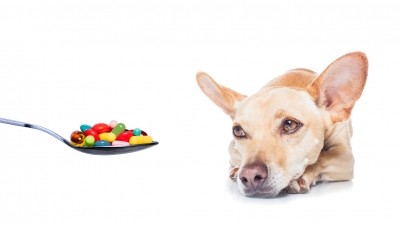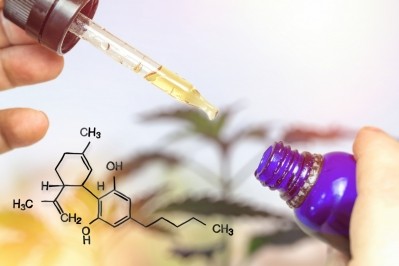CBD’s halo effect will boost pet supplement sales, analyst says

Around 67% of US pet-owners support the legalization of marijuana and other compounds derived from the cannabis plant compared to 56% for all US consumers.
Inadvertently, the ubiquity and popularity of CBD has helped shine the spotlight on pet supplements overall, according to Shannon Brown, senior pet consultant at the market research firm Packaged Facts.
“If pet owners who have not tried other types of pet supplements experience success with CBD supplements, drawn to them due to the growing popularity of CBD in the human supplement space, they may be more willing in the future to experiment with other types of supplements as well,” she told NutraIngredients-USA.
Packaged Facts’ data found that there have already been smaller pet supplement marketers that are ‘flooding’ the market with CBD products targeting conditions such as anxiety, pain management, and brain function.
Data from the National Animal Supplement Council (NASC), a trade group for the pet supplements industry, showed that there are 149 hemp products (of which CBD is derived) already on the market, some have been on the market for as much as 10 years.
CBD’s halo effect will be a significant driver in pet supplement sales, according to Packaged Facts, forecasted for annual gains averaging 5% in the coming years, “lifting US retail sales above $800 million in 2023.”
Why pet owners want CBD products
The greatest percentage of pet owners are interested in CBD to address their pets’ anxiety, according to Packaged Facts’ survey data, which has responses from 2,000 US adults, including 842 dog owners and 519 cat owners.
Specifically, 23% of dog owners and 20% of cat owners said they are interested to use or have used CBD products to address their pets’ anxiety. This was followed by pain management (at 23% dog owners and 19% cat owners).
“Additionally, most of the CBD supplements currently available are based on natural ingredients, which is not the norm in pet supplements market overall,” Brown said, referring to ingredients that are not synthetic.
“However, because the idea of ‘natural’ products is so huge in other parts of the pet market, supplement marketers that introduce new CBD supplements will likely market them at least partially on their ‘all-natural’ ingredient list, tying in to this larger trend that speaks to both product safety and a ‘better for you’ mentality,” she added.
CBD’s legal status in pet food, supplements
Just as in the human nutrition space, the legal status of CBD for use in ingestible products is in a gray are. Despite hemp’s removal from the DEA’s Schedule I drug list after the passing of the Agricultural Improvement Act in 2018 (or Farm Bill), isolated CBD from hemp is an approved drug (Epidiolex) in the pharmaceutical sector, which from a technical regulatory perspective bars it from entering the nutritional space.
NASC agrees with the Association of American Feed Control Officials (AAFCO), which says that hemp and hemp derivatives are not approved for use in animal feed or nutritional products.
Two to three years ‘simply not acceptable’
Because of increased consumer demand for CBD products as well as rampant product development and launches in the space, the National Animal Supplement Council (NASC), a pet supplement industry trade group, requested that FDA establishes national-level regulatory guidelines within a reasonable time frame.
“Two-three years is simply not acceptable nor realistic given the rapidly increasing consumer demand,” according to the comment.
“To that end, NASC has initiated the formation of a task force of industry experts to help define and present to FDA and CVM a comprehensive pathway that we believe is both viable and responsible for all stakeholders.”
The Farm Bill only outlined the cultivation of hemp and does not address the production and use of hemp as a feed ingredient, “as such, like any other potential feed ingredient, hemp is still subject to the same level of review and approval as any other new feed ingredient,” according to a memo from AAFCO.
However, NASC is lobbying for its approval. “[We are] participating in the initiatives and committees to gain approval for use in animal nutritional products and we hope hemp seed oil will be approved as an omega contributor for dogs and cats early in 2020,” Bill Bookout, president of NASC, told us.
Bookout was present at the FDA public meeting on the path forward for CBD on Friday, June 3 in Silver Springs, MD. “[FDA was] clearly interested in establishing the intended use and benefit along with testing and quality control benchmarks,” Bookout said.
NASC’s wishlist for what comes next
In NASC’s comment to the FDA, which Bookout shared with NutraIngredients-USA, the association and its members asked for the regulatory agencies to work with the industry to define a viable pathway for the marketing of CBD and other hemp products on both the human and animal side.
“We would ask the agency to move rapidly to clearly define the meaning of CBD concentrates and isolates, and we fully support THC levels being limited to less than 0.3% for hemp,” the comment read.
Second is the establishment of safety. NASC claims that it has “invested significantly in what we believe is the most advanced system of vigilance in the world for these types of products.” It conducts its own safety tests and stores the data, of which the FDA, Center for Veterinary Medicine (CVM), state agencies, and international regulatory bodies have full access.
It has statistical analysis in milligrams per kilogram body weight for dogs, cats, and horses for hemp and hemp-derived products. Nine adverse events have been reported, none serious, in over 18 million administrations in the three species.
“While we agree that more research in all areas is needed, we very strongly believe that the data at this time suggests these compounds, provided by responsible companies, does not pose undue risk to dogs, cats, and horses,” the association said in its comment.


















